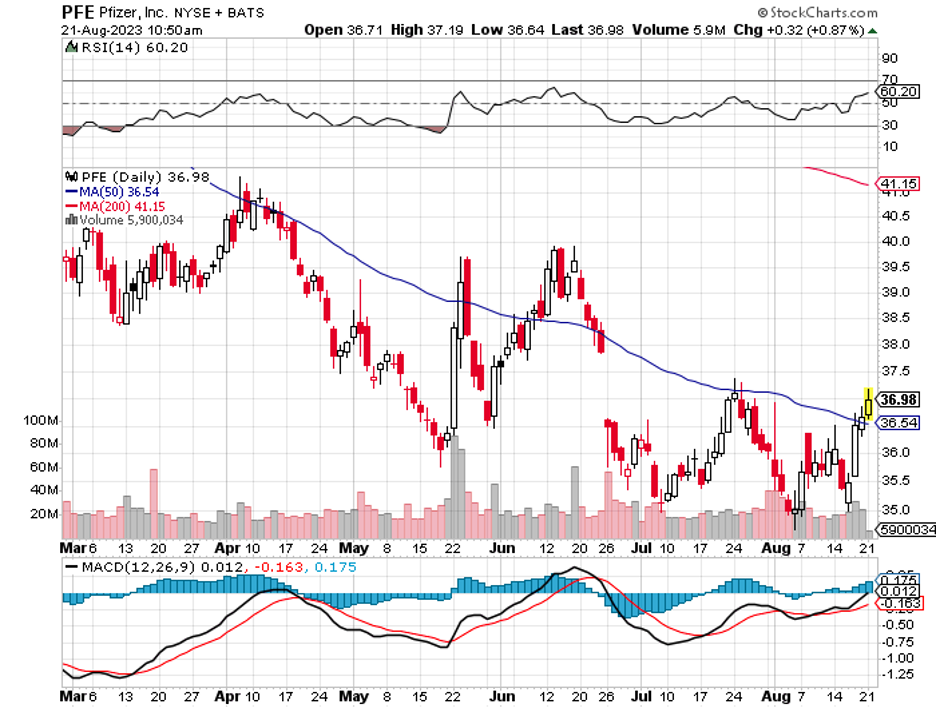A Bargain Hunter's Guide
The winds of change are blowing in the financial markets, teetering on the cusp of a new bull era. The trajectory of the S&P 500 stirs heated debates; some market seers assert the bull has already charged, while others counter that the index must first conquer its zenith.
Regardless of the stance, savvy investors stand poised, curating their ideal catalogs of stocks for purchase, with Pfizer (PFE) at a tumultuous intersection.
Pfizer wrestles with remarkable dips in yearly revenue and earnings. The shadow of imminent patent expirations over key drugs looms large, posing a serious challenge to future profits. However, a closer examination of Pfizer's situation reveals threads of optimism and inventive vision.
Its sturdy dividend yield is an example of resilience, and Pfizer's future sparkles with upcoming product debuts, potential harbingers of a revenue revival. Trading at a pivotal support level, a detailed look at the stock's historical patterns suggests glimmers of a lucrative long-term acquisition opportunity.
For Q2 2023, Pfizer unveiled revenues of $12.73 billion, a staggering 54% reduction, a decline of $15 billion year-over-year. This abrupt decline can be attributed to shrinking global returns from Paxlovid and Comirnaty, intertwined with a significant foreign exchange impact.
Paxlovid's revenue plummeted by 98% or $8 billion, mainly due to a pause in U.S. sales and reduced contractual deliveries in various global markets. Comirnaty also suffered, with revenue plunging 82% or $7.3 billion, primarily because of softened demand and contractual pullbacks.
Amid this storm, however, a beacon of growth gleams.
Excluding Comirnaty and Paxlovid, a 5% operational growth emerged, gathering $537 million. This growth is spurred by fresh entrants like Nurtec ODT/Vydura and Oxbryta, which raked in $247 million and $77 million, respectively, and boosted by the Vyndaqel family's robust 43% rise. Some products, such as Inflectra and Ibrance, faced contractions, revealing a varied performance landscape.
Despite subdued quarterly outcomes, the broader earnings picture radiates a potent positive trend. Pfizer's 4.6% dividend yield remains hearty, reflecting the company's strong financial base, even as challenges arise.
This resilience springs from upcoming product launches, positioned to infuse an additional $20 billion by 2030, potentially offsetting the impending patent cliff.
Innovations like Litfulo for alopecia areata and the respiratory syncytial virus vaccine, Abrysvo, echo Pfizer's dedication to medical breakthroughs. Furthermore, prospective drugs like Elrexfio and etrasimod shine on the regulatory horizon, further boosting the anticipation of revenue fortification.
Pfizer's ambitions include projected business development activities, potentially adding $25 billion in revenue by 2030.
The forthcoming acquisition of Seagen, planned for completion by early 2024, could pump over $10 billion into Pfizer's coffers, complemented by Seagen's impressive cancer drug roster.
Strategic procurements like Arena Pharmaceuticals, Biohaven, and Global Blood Therapeutics emphasize Pfizer's commitment to future revenue growth.
Moreover, Pfizer's stock trajectory paints a bullish long-term panorama.
Historically, between 1999 and 2009, a bull flag pattern emerged, only to be interrupted by global turmoil.
A significant revival post-2009 heralded a new era, culminating in a peak of $57.95, set against global recovery, strategic mergers, cost efficiencies, and Pfizer's pivotal role in the COVID-19 fight.
The recent decline appears normal, and the stock is nearing a sturdy support range of $30-$35. This range, examined alongside historical patterns, seems an ideal foundation for the coming years.
Understandably, sharp revenue declines could shake investor faith and obstruct Pfizer's progress, but a keen analysis suggests underlying resilience.
Investors must tread with awareness of inherent risks, from commercial success uncertainty to global economic volatility. Nevertheless, Pfizer's narrative of undervalued potential and its robust financial standing and strategic positioning offer a compelling investment prospect.
Current levels signal opportunities for buying, with room to increase holdings if the price further softens.
In conclusion, Pfizer's recent trials, from revenue falls to patent cliffs, mask an underlying resilience and forward-thinking prowess that hints at a potential resurgence.
The stock, settling near a robust support zone, conveys signs of price reversals and long-term promise. Though risks remain, the combination of financial acumen, strategic growth plans, and anticipation of new product launches make Pfizer an intriguing investment opportunity.
Investors looking for growth and stability in the pharmaceutical sector would do well to consider Pfizer as a part of their portfolio, bearing in mind the importance of vigilance in the face of potential challenges.

